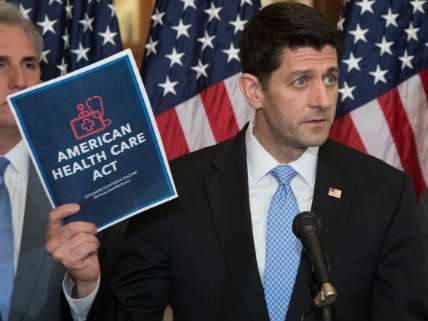CBO Says the GOP's Updated Obamacare Repeal Bill Would Be Worse for the Deficit
The Republican health care bill would still reduce insurance by 24 million and raise insurance premiums before 2020.

On Monday, House GOP leadership released a package of updates to the health care bill in the form of a manager's amendment. The changes, which included a carve out for New York state legislators and bonuses to states that implement work requirements in Medicaid, were designed to appease holdouts, many of whom are members of the House Freedom Caucus, a group of conservative lawmakers.
The changes aren't likely to win over many conservative lawmakers, however, because the main effect would be to cut the health care bill's projected deficit reduction in half. The initial version of the law would reduce the deficit by about $337 billion over a decade, according to the Congressional Budget Office. But according to an updated CBO score released tonight, the new version incorporating the manager's amendment would only cut the deficit by about $150 billion. And what deficit reduction there is would take eight years to actually kick in, thanks to the way the bill's tax and spending provisions are timed.
On all the other major measures, the CBO's estimates remain the same. The bill would still reduce insurance coverage by 24 million, relative to current law, a decade from now. Individual market premiums would still rise by 15 to 20 percent more than they otherwise would between now and 2020, and then fall relative to the trendline after 2020 (at least for younger people).
The manager's amendment, in other words, made no difference in the CBO's estimates of the law's performance, except to make it worse for the budget.
The CBO's new estimate does not account for other changes Republicans are reportedly considering making to the bill, like eliminating Obamacare's essential health benefits rules. But it's hard to imagine that any conservative holdouts will look at the new score and come away pleased.
It certainly doesn't provide backers of the bill with any useful talking points. When the CBO score for the original bill was released, Speaker of the House Paul Ryan praised it, saying that the CBO score confirmed that the health care bill would reduce the federal deficit by $337 billion. The CBO has now confirmed that the latest version of the bill reduces the deficit by a lot less.
With a vote on the bill delayed until tomorrow, and possibly longer, the bill is already struggling to pick up enough support to pass. The CBO's latest report isn't likely to boost its chances.


Show Comments (36)